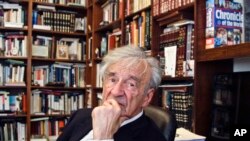Praise for the life of holocaust survivor and Nobel Peace Prize winner Elie Wiesel is being heard from around the world.
Wiesel, who survived the hell of Nazi death camps, died Saturday at 87.
U.N. Secretary-General Ban Ki-moon said Sunday, "The world has lost one of its most important witnesses, and one of its most eloquent advocates of tolerance and peace." He added, "Elie Wiesel turned the nightmare of his youth into a lifelong campaign for global equality and peace.
Wiesel has been a UN Messenger of Peace since 1998, and Ban said he had called for constant vigilance in combating anti-Semitism and other forms of hatred.
U.S. Ambassador to the U.N. Samantha Power said, "With the passing of Elie Wiesel, the world has lost a great and wise man; those who fight injustice have lost a daily inspiration..."
Saturday, U.S. President Barack Obama called Wiesel a dear friend who was "one of the great moral voices of our time."
"He raised his voice, not just against anti-Semitism, but against hatred, bigotry and intolerance in all its forms. He implored each of us, as nations and as human beings, to do the same, to see ourselves in each other abnd to make real the pledge of 'never again.'"
Israeli Prime Minister Benjamin Netanyahu mourned Wiesel by saying he "gave expression to the victory of the human spirit over cruelty and evil."
"In the darkness of the Holocaust, in which our sisters and brothers were killed, six-million, Elie Wiesel served as a ray of light and example of humanity who believed in the goodness in people."
The Romanian-born Wiesel was shipped off to the notorious Auschwitz death camp in 1944 along with most of his immediate family.
His parents and a sister were murdered, but Wiesel survived Nazi brutality to start a career as a professional journalist.
A French writer persuaded him to tell his stories about the Holocaust and Wiesel's memoir, Night, was published in 1958.
It has sold millions of copies in 30 languages and is required reading in many schools around the world and for anyone who wants to know about some of the darkest years of human history.
Wiesel wrote other Holocaust memoirs along with works of fiction and non-fiction.
He won the 1986 Nobel Peace Prize for speaking out against war, discrimination, and suppression of human rights and for keeping memories of the Holocaust alive.
Among the numerous honors and awards given to Wiesel throughout his life are U.S. Presidential Medal of Freedom, the French Legion of Honor Grand Cross, and was knighted a Commander of the Order of the British Empire.
In 1978, U.S. President Jimmy Carter appointed Wiesel as the head of the Presidential Commission on the Holocaust, which led to the creation of the Holocaust Museum in Washington.
Wiesel's words are carved on the outside of the building, spelling out the purpose of a museum documenting inhumanity — "for the dead and the living, we must bear witness."






